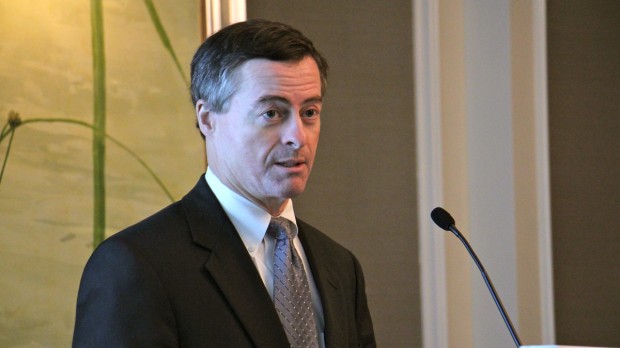Pennsylvania still working on Clean Power Plan, but won’t meet deadline
-
Katie Colaneri

Emma Lee/WHYY
Pennsylvania DEP Secretary John Quigley speaks to members of the Greater Philadelphia Chamber of Commerce.
While President Obama’s initiative to get states to cut carbon emissions — known as the Clean Power Plan — is being challenged in federal court by 24 states, Pennsylvania is still moving forward with its plans.
“The rule isn’t final and we can’t shoot at a moving target,” he told reporters after the event.
The first deadline for states to submit Clean Power Plan compliance reports is in September. Quigley said Pennsylvania will not comply with that deadline, but his agency will continue to gather data and to meet regularly with industry and environmental interests. That’s despite the fact two of the state’s largest electric generators asked DEP to submit the plan as soon as possible so they would have time to make adjustments, Quigley said.
“Once we have some clarity coming out of the courts, we can then move, I think very rapidly, to finalize a plan,” he said.
Earlier this year, in a surprise 5-4 decision, the U.S. Supreme Court issued a temporary stay on the Clean Power Plan, President Obama’s landmark initiative to tackle climate change. The high court’s decision means the plan can’t move forward until the legal challenges to it are sorted out.
In the meantime, Quigley said the state is taking other steps to cut greenhouse gas emissions, such as cracking down on methane leaks from natural gas production. DEP is also working on a Climate Action Plan, which would encourage building more energy efficient infrastructure and combined heat and power plants, as well as increasing the state’s Alternative Energy Portfolio Standard — the amount of renewable energy utilities are required to buy.
Quigley noted the private sector has also played a large role in reducing the state’s carbon footprint.
“The market, the energy market has been the biggest driver for climate improvement in Pennsylvania over the last seven years,” he said. “Our [carbon dioxide] emissions have fallen 20 percent because of cheap shale gas and that’s huge.”
The U.S. Court of Appeals is set to hear oral arguments on the legality of the Clean Power Plan in late September.
















